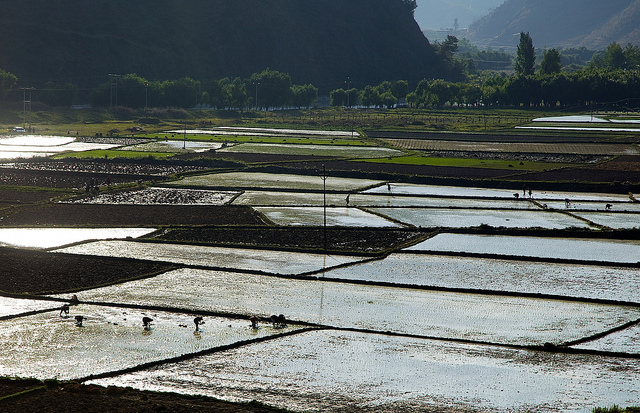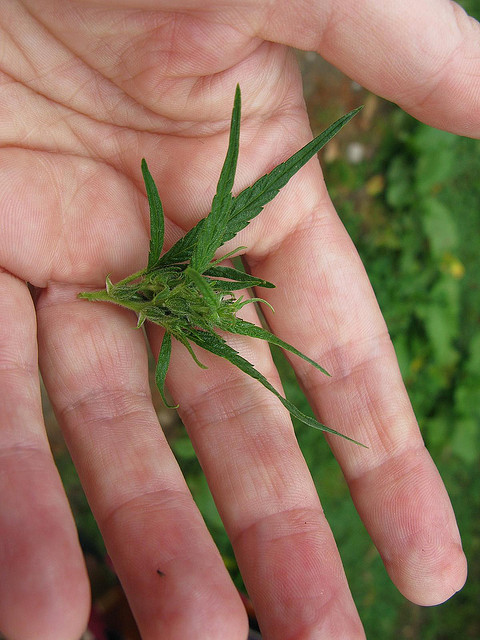The Himalayan Kingdom of Bhutan, famous for its “Gross National Happiness” Index instead of Gross Domestic Product, has set itself the task of becoming the first country in the world to become completely organic.
Jessica Carter, an Australian media and international development professional, shares the news in her blog “Red Shoes and Cobblestones”:
The small kingdom of 1.2 million people made an announcement that they would become the first wholly organic country in the world by banning the sale of chemical pesticides and fertilisers.
It’s not the first time that Bhutan’s approach has raised eyebrows, and that’s probably because it’s not the first time they’ve chosen a solution that bucks the trends being followed by the rest of the world.
Explaining that decision, the minister of agriculture and forests, a farmer himself, was quoted as saying quite simply that:
“We like to see plants happy and insects happy”

Agriculture in Bhutan contributes to 35.9% of GDP of the nation. Image from Flickr by Michael Foley. CC BY-NC-ND
Indian activist Aarthi Parthasarathy (@aarthipartha) tweeted:
@aarthipartha (Aarthi Parthasarathy): What is procedure to move to Bhutan? | Bhutan set to plough lone furrow as world's first wholly organic country http://gu.com/p/3dkfv/tw
Bhutan's online news site BBS has reported that the Buddhist Kingdom is putting in place a Bhutan Organic Certification System (BOCS) in order to “ensure that vegetables are 100 percent organic”. BBS interviewed a consultant with Bhutan's Agriculture and Food Regulatory Authority explaining how the BOCS works:
“We have developed a simple farmer’s diary which can be written in using Dzongkha …The farmers can note down their farm activities, where their seeds/manure are from, the type of bio-pesticides used. Every aspect of farming is documented…and verified by trained BAFRA inspectors by visiting the farms”, says a consultant with BAFRA, Dr.A Thimmaiah.”
BHT (@BHTFLASHNEWS) also announced that decision on Twitter:
@BHTFLASHNEWS (BHT Flashnews): News: A Bhutan Organic Certification System (BOCS) is being put in place to ensure that vegetables are 100 percent organic.
But as Singapore's Nanyang Technological University's Journalism Blog “Go Far Bhutan” reminded us that the challenges are great:
Many Bhutanese farmers live in remote villages, while others find that their crops do not thrive without pesticides and fertilizers. The country only produces 60 per cent of the crops it needs, never mind whether they are organic or not.
On the other hand, it is worth noting that according to news site “The Bhutanese”, Pema Gyamtsho, Bhutan's Minister of Agriculture and Forests, denied making such announcement officially in the first place after concerns raised by Opposition Leader Tshering Tobgay who was quoted as saying:
“It worries me because it’s a national pledge which can have huge impact on our farmers who are dependent on income from agricultural activities”
He further stated that while phasing out chemicals is a good idea, the reality on the ground makes its realization a hard task for the same reasons mentioned above.
“Some farmers can hardly produce sufficient food for personal consumption, let alone cash crops”
It is also worth noting that going fully organic is already being attempted in other parts of the world. Indeed, TreeHugger reported that the Indian State of Sikkim is already one-third of the way of being completely organic by 2015.
Sikkim's state agricultural minister was quoted in Calcutta's “The Telegraph” explaining how their process works:
The organic certification is a three-year process. Three agencies accredited to the APEDA issued C-1 certificates to 12,456 registered farmers who own 18,453 hectares in four districts of the state. The land gets the C-1 tag in the first year, followed by a C-2 in the second, and C-3 in the following years. The C-3 tag denotes that any crop produced on a particular plot is organic.
That being said, the very idea of Bhutan turning completely organic was received with enthusiasm among the world's netizens.
School Administrator Judith Renaud (@JudithRenaud) tweets that:
@JudithRenaud (Judith Renaud): Bhutan will show the world that we can defend our land, our food and ourselves against those who wish to poison us. http://bit.ly/YroO4m
Citizens Action Network members also announced their excitement on Facebook.
As to the Bhutanese reaction, “Go Far Bhutan” released this video report.








3 comments